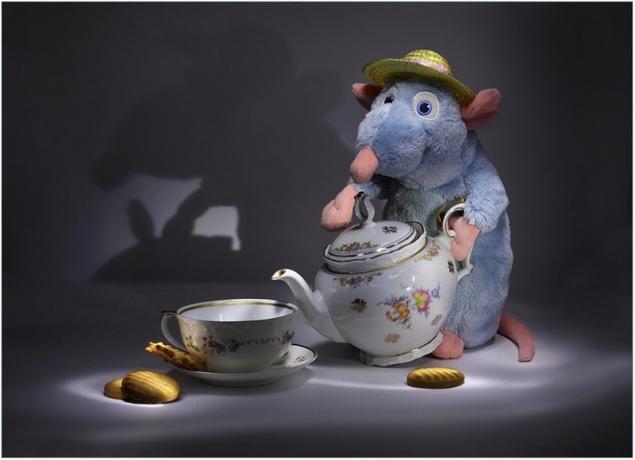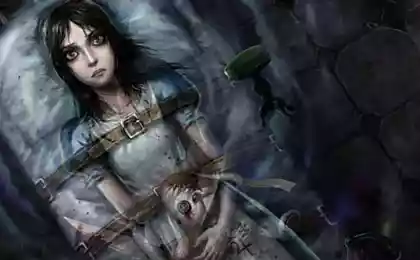572
The other, which is NOT: Carlson's Syndrome in children
Fantasy baby has no borders: all the candy out of the vase carried not he, but the cat, and in kindergarten, he jumped above all... the roof! And it touches all parents. However, when a conspiratorial tone said: "And we are here with the gnome Vasya drink tea", while in the room no one, we're not joking. Why does a kid start imaginary friends, is this normal? And what to do about it?

The reaction of parents to similar childhood fantasies can be very diverse: some require to stop these inventions and abused for the mere mention of "friend fun", others lead a child to a psychologist and then a psychiatrist. Meanwhile, the majority of experts says — the emergence of an imaginary friend at the age of 3 to 6 (or even 7) years is a normal occurrence.
Studies conducted by American psychologists showed that personal Carlson has 65% of children in this age group.
Most often an imaginary friend — man, "animated" toy or some kind of animal. It is worth noting that we are talking about children with high intelligence and developed creative abilities. Still — a joke of such a thing! In a fantasy world kid, everything is possible - the Cheshire cat disappears, leaving only a smile, an ordinary mitten becomes a loyal puppy... why Carlson and others like him don't belong here? Besides, it often happens that the child sees in his fantasies nothing wrong and is willing to share them with parents. But often, around a quarter of cases, dad and mom don't have the slightest idea about the "secret" of Chad. And in this situation it is worth considering — why? And to try to meet an imaginary friend closer — he can serve as a good diagnostic material for parents, saying that care of the baby, which he is lacking in the relationship.
Because, like it or not, Carlson always arrives at the address.
GOOD REASON: For the emergence of an imaginary friend in a child there is always a reason. Although sometimes it's the overly developed imagination of a child — then, bored, or left alone, the baby begins to entertain herself in this manner. But, as a rule, this is due to the presence of certain psychological problems.
LACK of COMMUNICATION: Often, Carlson appears in severe time — for example, do not ladyatsya relationships with peers (because of the shyness, of the struggle for leadership) or weak contact with parents (if they are too immersed in their care, or the family had another child). Imaginary friend in this situation, firstly, will provide an opportunity to communicate in a mode comfortable for the baby (all day!), second, it helps to cope with stress.
PRESSURE OR HYPER: Sometimes parents abuse prohibitions or keep the child under surveillance and in that and in other case, the place for self expression I don't have. Whether it is in a dream world: there can be everything — to walk on the roofs, is jam for lunch, you can even become a "parent" (limiting and instructing imaginary friends). This area of freedom gives the child the illusion of independence and self-worth.
GUILT: the Child feels guilty much more often than it might seem — for example, if parents divorced ("It's all my fault — I behaved badly"). To ease these painful experiences helps the care in the dream world. Your imaginary friend can complain of the injustice of the world and thus remove tension, but you can... punish! Or to blame their own guilt on him: "It's not me, it's all him! I'm good!".
INSECURE, Vulnerable baby is particularly acute all the angles of reality, it would be hard to get along in the team, it seems that all the hurt... But then comes the other-the defender (Superman or Spiderman) and the world is magically changed. It may be just a fantasy — it is already easier. Playing with invented other, the child becomes more confident.
LACK of experience: AND sometimes, the kid just... boring! Every day is the same: kindergarten routine or a walk with the nanny at the Playground, where all the familiar cracks. And so I want to fly like Peter pan, to go on a long journey, like Sinbad the sailor! What to expect when it happens in reality, is it not better to write the story yourself and then go in with your best friend?
THE GOLDEN MEAN
Regardless of the causes of the appearance of an imaginary companion, this creature always help him, support him in everything, is a kind of second self — a reflection of the emerging personality of the child. So familiarity with it can be very helpful! You may even want to play along with the kid to show that his friend is very pretty, to ask about his mood, to ask about the adventure.

However, it is important not to overreact, not to manipulate the child using his friend, "Look, dwarf long ago eaten, what are you sitting on a plate?"). It is ugly — after all it's his magical world, and you get so prudently, with their educational goals... However, to go to the other extreme and childish to think of Carlson as a very real person, is also not necessary — the child expects to rely on your common sense in which case...
WHAT NOT TO DO?
To prohibit the communication by the friend and the blame for it.
The baby still will not abandon their "tales", will only do it on the sly from you. Which is better?
To make fun of the child for imagination. It is fraught with loss of confidence in you and even the acquisition of persistent behavioral complexes.
To convince Carlson not exist. It will take quite some time — and he samolikvidirovalsja (usually 7-9 years). So why now to fight with him, risking aggression of the kid — for him, this character is very much alive? Like Santa Claus, for example. After all, childlike faith in the good grandfather we support.
SHOULD:
Be happy for the little dreamer who is trying to cope with emotional problems on their own.
Try to give Chad more time and attention — it's never crowded.
To try to replace imaginary friend is real — for example, to finally buy a dog, about which the child has long dreamed.
TELL ME, DOCTOR...
Sometimes, however, the existence of an imaginary friend may indicate serious psychological problems of the child, which can be solved only with the aid of a specialist. This is worth considering if:
-the child does not separate games from reality, badly goes on contact;
-can become overly dependent on an imaginary friend, not interested in anything more;
his fantasies abound with dark and violent stories.
Specialist will help to understand the causes of paints grim they might be some kind of mental trauma or the peculiarities of family environment! This way the baby can pour out their feelings caused by their parents ' divorce or frequent conflicts between them. In General, referring to the therapist about the children's problems, we must be prepared for the fact that the treatment need of adults because they often are "things" that affect all problems.
BABY, I'M BETTER!
Interestingly, imaginary companions in children have always existed, but the embodiment of them became the "best friend in the world" Carlson from the famous books by Astrid Lindgren.
What is its phenomenon? It is almost perfect!
First, it is easy and shamelessly violates all norms strongly (about it sometimes who doesn't?). Second, can fly is a secret and impossible desire of a person (age pritupleny). Thirdly, it is absolutely free — it lives on the roof, nobody obeys. Wanted — left, want back. Even he's not: try to understand what it means, "a man in the Prime of life"? We can assume that Carlson is immortal (this is important too — man always bothered the secret fear of death). In General, it's an ideal (and not only for a child) — is unattainable, and therefore even more alluring. Interestingly, the book about the Kid and Carlson — the most popular part of the heritage of Astrid Lindgren in the former Soviet Union, while Europe prefers the Pippi Longstocking. Perhaps the reason that we find plenty of harmonies of this tale with our reality. published
Author: Victoria Shaparenko
P. S. And remember, just changing your mind — together we change the world! ©
Source: asonov.com/zdorovie/sindrom-karlsona.html

The reaction of parents to similar childhood fantasies can be very diverse: some require to stop these inventions and abused for the mere mention of "friend fun", others lead a child to a psychologist and then a psychiatrist. Meanwhile, the majority of experts says — the emergence of an imaginary friend at the age of 3 to 6 (or even 7) years is a normal occurrence.
Studies conducted by American psychologists showed that personal Carlson has 65% of children in this age group.
Most often an imaginary friend — man, "animated" toy or some kind of animal. It is worth noting that we are talking about children with high intelligence and developed creative abilities. Still — a joke of such a thing! In a fantasy world kid, everything is possible - the Cheshire cat disappears, leaving only a smile, an ordinary mitten becomes a loyal puppy... why Carlson and others like him don't belong here? Besides, it often happens that the child sees in his fantasies nothing wrong and is willing to share them with parents. But often, around a quarter of cases, dad and mom don't have the slightest idea about the "secret" of Chad. And in this situation it is worth considering — why? And to try to meet an imaginary friend closer — he can serve as a good diagnostic material for parents, saying that care of the baby, which he is lacking in the relationship.
Because, like it or not, Carlson always arrives at the address.
GOOD REASON: For the emergence of an imaginary friend in a child there is always a reason. Although sometimes it's the overly developed imagination of a child — then, bored, or left alone, the baby begins to entertain herself in this manner. But, as a rule, this is due to the presence of certain psychological problems.
LACK of COMMUNICATION: Often, Carlson appears in severe time — for example, do not ladyatsya relationships with peers (because of the shyness, of the struggle for leadership) or weak contact with parents (if they are too immersed in their care, or the family had another child). Imaginary friend in this situation, firstly, will provide an opportunity to communicate in a mode comfortable for the baby (all day!), second, it helps to cope with stress.
PRESSURE OR HYPER: Sometimes parents abuse prohibitions or keep the child under surveillance and in that and in other case, the place for self expression I don't have. Whether it is in a dream world: there can be everything — to walk on the roofs, is jam for lunch, you can even become a "parent" (limiting and instructing imaginary friends). This area of freedom gives the child the illusion of independence and self-worth.
GUILT: the Child feels guilty much more often than it might seem — for example, if parents divorced ("It's all my fault — I behaved badly"). To ease these painful experiences helps the care in the dream world. Your imaginary friend can complain of the injustice of the world and thus remove tension, but you can... punish! Or to blame their own guilt on him: "It's not me, it's all him! I'm good!".
INSECURE, Vulnerable baby is particularly acute all the angles of reality, it would be hard to get along in the team, it seems that all the hurt... But then comes the other-the defender (Superman or Spiderman) and the world is magically changed. It may be just a fantasy — it is already easier. Playing with invented other, the child becomes more confident.
LACK of experience: AND sometimes, the kid just... boring! Every day is the same: kindergarten routine or a walk with the nanny at the Playground, where all the familiar cracks. And so I want to fly like Peter pan, to go on a long journey, like Sinbad the sailor! What to expect when it happens in reality, is it not better to write the story yourself and then go in with your best friend?
THE GOLDEN MEAN
Regardless of the causes of the appearance of an imaginary companion, this creature always help him, support him in everything, is a kind of second self — a reflection of the emerging personality of the child. So familiarity with it can be very helpful! You may even want to play along with the kid to show that his friend is very pretty, to ask about his mood, to ask about the adventure.

However, it is important not to overreact, not to manipulate the child using his friend, "Look, dwarf long ago eaten, what are you sitting on a plate?"). It is ugly — after all it's his magical world, and you get so prudently, with their educational goals... However, to go to the other extreme and childish to think of Carlson as a very real person, is also not necessary — the child expects to rely on your common sense in which case...
WHAT NOT TO DO?
To prohibit the communication by the friend and the blame for it.
The baby still will not abandon their "tales", will only do it on the sly from you. Which is better?
To make fun of the child for imagination. It is fraught with loss of confidence in you and even the acquisition of persistent behavioral complexes.
To convince Carlson not exist. It will take quite some time — and he samolikvidirovalsja (usually 7-9 years). So why now to fight with him, risking aggression of the kid — for him, this character is very much alive? Like Santa Claus, for example. After all, childlike faith in the good grandfather we support.
SHOULD:
Be happy for the little dreamer who is trying to cope with emotional problems on their own.
Try to give Chad more time and attention — it's never crowded.
To try to replace imaginary friend is real — for example, to finally buy a dog, about which the child has long dreamed.
TELL ME, DOCTOR...
Sometimes, however, the existence of an imaginary friend may indicate serious psychological problems of the child, which can be solved only with the aid of a specialist. This is worth considering if:
-the child does not separate games from reality, badly goes on contact;
-can become overly dependent on an imaginary friend, not interested in anything more;
his fantasies abound with dark and violent stories.
Specialist will help to understand the causes of paints grim they might be some kind of mental trauma or the peculiarities of family environment! This way the baby can pour out their feelings caused by their parents ' divorce or frequent conflicts between them. In General, referring to the therapist about the children's problems, we must be prepared for the fact that the treatment need of adults because they often are "things" that affect all problems.
BABY, I'M BETTER!
Interestingly, imaginary companions in children have always existed, but the embodiment of them became the "best friend in the world" Carlson from the famous books by Astrid Lindgren.
What is its phenomenon? It is almost perfect!
First, it is easy and shamelessly violates all norms strongly (about it sometimes who doesn't?). Second, can fly is a secret and impossible desire of a person (age pritupleny). Thirdly, it is absolutely free — it lives on the roof, nobody obeys. Wanted — left, want back. Even he's not: try to understand what it means, "a man in the Prime of life"? We can assume that Carlson is immortal (this is important too — man always bothered the secret fear of death). In General, it's an ideal (and not only for a child) — is unattainable, and therefore even more alluring. Interestingly, the book about the Kid and Carlson — the most popular part of the heritage of Astrid Lindgren in the former Soviet Union, while Europe prefers the Pippi Longstocking. Perhaps the reason that we find plenty of harmonies of this tale with our reality. published
Author: Victoria Shaparenko
P. S. And remember, just changing your mind — together we change the world! ©
Source: asonov.com/zdorovie/sindrom-karlsona.html























